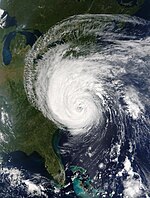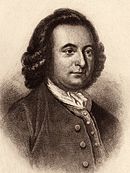The Virginia Portal  Virginia, officially the Commonwealth of Virginia, is a state in the Southeastern and Mid-Atlantic regions of the United States between the Atlantic Coast and the Appalachian Mountains. The state's capital is Richmond and its most populous city is Virginia Beach, though its most populous subdivision is Fairfax County, part of Northern Virginia, where slightly over a third of Virginia's population of 8.72 million live. The Blue Ridge Mountains cross the western and southwestern parts of the state. The state's central region lies predominantly in the Piedmont. Eastern Virginia is part of the Atlantic Plain, and the Middle Peninsula forms the mouth of the Chesapeake Bay. The fertile Shenandoah Valley fosters the state's most productive agricultural counties, while the economy in Northern Virginia is driven by technology companies and U.S. federal government agencies, including the U.S. Department of Defense and Central Intelligence Agency. Hampton Roads is also the site of the region's main seaport and Naval Station Norfolk, the world's largest naval base. (Full article...) Selected article
Hurricane Isabel was the costliest and deadliest hurricane in the 2003 Atlantic hurricane season. The ninth named storm and fifth hurricane of the season, Isabel formed near the Cape Verde Islands from a tropical wave on September 6 in the tropical Atlantic Ocean. It moved northwestward and steadily strengthened to reach peak winds of 165 mph (265 km/h) on September 11. Isabel gradually weakened and made landfall on the Outer Banks of North Carolina with winds of 105 mph (165 km/h) on September 18, quickly weakening over land and became extratropical over western Pennsylvania the next day.
The worst effects of Isabel occurred in Virginia, especially in the Hampton Roads area and along the shores of rivers as far west and north as Richmond and Washington, DC. Electric service was disrupted in areas of Virginia for several days, some more rural areas were without electricity for weeks, and local flooding caused thousands of dollars in damage. Overall, roughly six million people overall were left without electric service in the eastern United States and damage totalled about $5.7 billion (2003 USD, $9.44 billion 2024 USD). 16 deaths in seven U.S. states were directly related to the hurricane, with 35 deaths in six states and one Canadian province indirectly related to the hurricane. Selected biography
George Mason IV (December 11, 1725 [O.S. November 30, 1725] – October 7, 1792) was an American planter, politician and delegate to the U.S. Constitutional Convention of 1787, one of three delegates who refused to sign the Constitution. His writings, including substantial portions of the Fairfax Resolves of 1774, the Virginia Declaration of Rights of 1776, and his Objections to this Constitution of Government (1787) in opposition to ratification, have exercised a significant influence on American political thought and events. The Virginia Declaration of Rights, which Mason principally authored, served as a basis for the United States Bill of Rights, of which he has been deemed the father.
Mason was born in 1725, most likely in what is now Fairfax County, Virginia. He married in 1750, built Gunston Hall, and lived the life of a country squire, supervising his lands, family, and slaves.As tensions grew between Britain and the American colonies, Mason came to support the colonial side, and used his knowledge and experience to help the revolutionary cause, finding ways to work around the Stamp Act of 1765 and serving in the pro-independence Fourth Virginia Convention in 1775 and the Fifth Virginia Convention in 1776. Mason prepared the first draft of the Virginia Declaration of Rights in 1776, and his words formed much of the text adopted by the final Revolutionary Virginia Convention. During the American Revolutionary War, Mason was a member of the powerful House of Delegates of the Virginia General Assembly but, to the irritation of Washington and others, he refused to serve in the Continental Congress in Philadelphia, citing health and family commitments. Mason was in 1787 named one of his state's delegates to the Constitutional Convention and traveled to Philadelphia, his only lengthy trip outside Virginia. He was active in the convention for months before deciding that he could not sign it. He cited the lack of a bill of rights most prominently in his Objections, but also wanted an immediate end to the slave trade and a supermajority for navigation acts, which might force exporters of tobacco to use more expensive American ships. He failed to attain these objectives there, and again at the Virginia Ratifying Convention of 1788, but his prominent fight for a bill of rights led fellow Virginian James Madison to introduce one during the First Congress in 1789; these amendments were ratified in 1791, a year before Mason died. Obscure after his death, Mason has come to be recognized in the 20th and 21st centuries for his contributions both to the early United States and to Virginia. This month in Virginia history
Random Virginia articleA random generator will select an article about… 
(note: generator may be slow) Things you can do
Tasks
Selected imageDid you know -
Fact sheet
State symbols:
Government
Related portalsVirginia topicsSubcategoriesSelect [+] to view subcategories
Associated WikimediaThe following Wikimedia Foundation sister projects provide more on this subject:
Discover Wikipedia using portals |



























